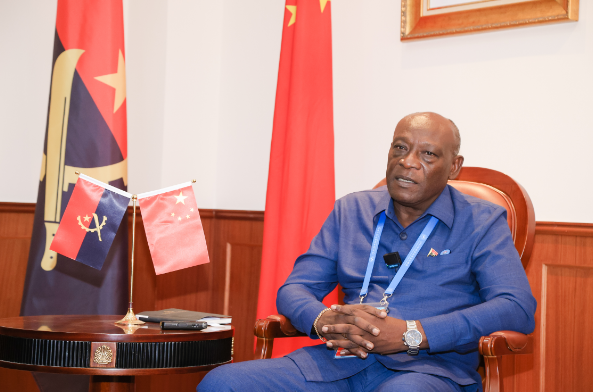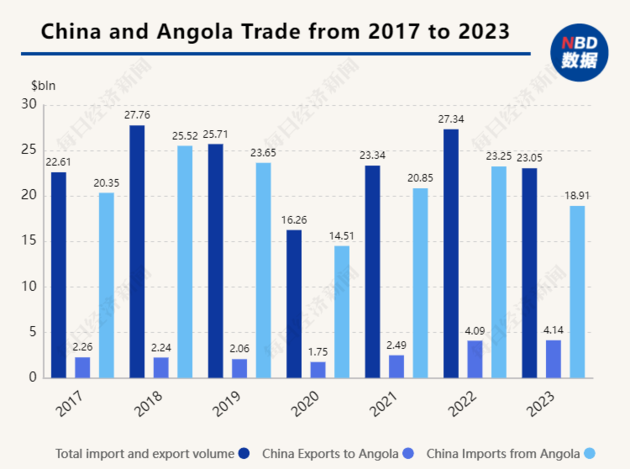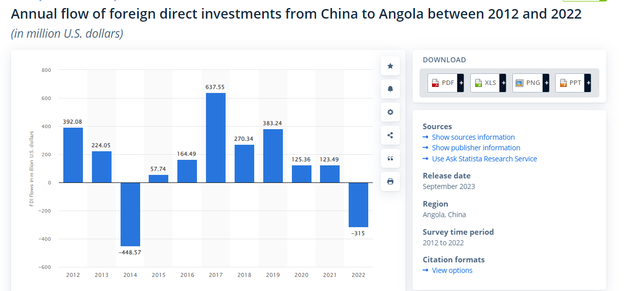Food security and agricultural development are one of the important fields and priority directions of cooperation between China and African countries in the joint building of the "Belt and Road" initiative.
At 2024 Summit of the Forum on China-Africa Cooperation (FOCAC), China decided that it will provide 1 billion yuan in emergency food aid to Africa, build 100,000 (6667 hectares) of overseas demonstration areas of Chinese agricultural standardization, send 500 agricultural experts to African countries and help to build or upgrade ten agricultural technology demonstration center. China will also establish a China-Africa agricultural science and technology innovation alliance.
In recent years, under China-proposed Belt and Road Initiative, practical cooperation between China and Angola has yielded substantial results. Angola has become China's second-largest African trading partner, while China is Angola's largest trade partner. An increasing number of Chinese enterprises are investing and operating in Angola, actively participating in the country's economic diversification process.
During the FOCAC, National Business Daily (NBD) had an exclusive interview with António Francisco de Assis (António Assis), Minister For Agriculture and Forestry of Angola. António Assis said to NBD that China has been and will continue to be one of the largest partners of Angola and the entire African continent.
As the Minister of Agriculture and Forestry, António Assis believes that food production is one of the most critical needs of Angola and Chinese companies have been actively involved in Angola for many years in agricultural talent training, teaching grain production technology, and knowledge of natural and planted forestry, and have achieved many fruitful results.
In the future, he hopes to invite more Chinese enterprises to deeply participate in the construction of Angola's "value chain of agriculture" and "continental fisheries" and further deepen cooperation with the local area.

António Assis Photo/provided to NBD
Food Production is One of Angola's Most Critical Needs
NBD: What are the current economic development challenges faced by Angola? What key goals do you expect China and Angola to achieve in terms of economic cooperation?
António Assis: For Angola, essentially, food production is one of the most critical needs.
Our government's primary goal in agriculture is to produce high-quality crops, that is, to first achieve food security. In this regard, Angola has excellent natural conditions. Firstly, Angola's climate is suitable for crop growth, and secondly, Angola's demographic structure is very young, which is conducive to agricultural production.
Angola currently has two routes for agricultural development. The first route is related to family agriculture, accounting for 90% of the country's agricultural production; the second is related to agricultural companies, led by small, medium, and large agricultural companies. As a government department, we need to establish good connections between these two routes to ensure domestic food security.
When it comes to challenges, our biggest challenge is to produce enough food to feed people, and then use the produced food to exchange for foreign currency, contribute to the country's GDP, and diversify our economy.
Another major challenge lies in the construction of talent capabilities and training professionals.
Currently, all of our agricultural workers are young and need professional training. Because our country has experienced many years of war, many agricultural experts have died in the war, so we are in urgent need of training the next generation. This is very important for us, and China will also lend a helping hand in this regard. We will work closely with the Chinese Ambassador to Angola to do our best to let the younger generation learn and utilize new technologies and valuable experience from China.
Finally, the construction of the "value chain of agriculture" is also one of the challenges. The "value chain of agriculture" includes seed production, mechanization, fertilizer production, etc., and we are also very welcoming to Chinese companies that wish to invest in these areas.
NBD: In March of this year, China and Angola officially established a comprehensive strategic cooperative partnership. Can you introduce the current status of cooperation between China and Angola in the agricultural field?
António Assis: As the Minister of Agriculture and Forestry of Angola, and one of the members of the Angolan national delegation visiting China this time, I must say that China has been and will continue to be one of the largest partners of Angola and the entire African continent.

Photo/NBD
Since the beginning of this century, the cooperation between the Angolan government and China in many fields, especially in agriculture, has been visibly fruitful. For example, last March, we visited China and contacted an Irish high-quality potato planting expert from China. A month later, we invited this expert to Angola and evaluated the local land and all conditions for planting Irish high-quality potatoes in Malanje Province. Subsequently, we officially launched this project. On September 15th of this year, we have officially started to develop the planting of Irish high-quality potatoes on a large scale in the region, a scale that Angola has never had before.
Chinese Enterprises Have Deeply Participated in Development of Angola's Forestry and Fishery Fields
NBD: We have noticed that more and more Chinese enterprises are investing and starting businesses in Angola, actively promoting the economic diversification process of Angola. What are the key investment areas for Chinese enterprises in Angola?
António Assis: In the past, Angola's food was largely dependent on imports, but now we mainly rely on our own production.
China has given us a lot of support, first helping us train human resources, and making us understand how to achieve food security.
Second, in the field of grain production such as corn and rice, Chinese companies have established many successful partnerships with local enterprises in Angola over the past three years. In September of this year, we will actively cooperate with Chinese companies to start planting and producing other crops such as wheat and soybeans.
Third, in the field of natural and planted forestry, the cooperation between the two sides is also very close. We are very keen to learn about China's knowledge in the field of forestry, and many Chinese companies are also helping us in this area, including various tree planting techniques, as well as subsequent processing procedures for forestry and timber, such as how to process timber for paper production, etc.
Finally, there is fishery. What everyone understands as fishery might be seafood, but I want to talk about "continental fisheries area," which is the development of fishery in the lakes and rivers located inland in Angola. These places can also develop some seafood farming, such as shrimp. So far, there are already Chinese companies engaged in fish farming in Angola, but we still welcome more Chinese companies to participate.

Photo/Statista
NBD: For Chinese enterprises that are willing to invest and start businesses in Angola in the future, what suggestions do you have or what help can you provide?
António Assis: We (agricultural department) and the Angolan Embassy in China will provide the greatest help and support to Chinese companies.
If Chinese companies go to Angola to do business, we will not require Chinese companies to establish partnerships with Angolan companies, and Chinese companies do not have this obligation. Therefore, Chinese companies can set up their own enterprises in Angola or cooperate with local enterprises, which is entirely up to them.
In terms of the output flow of production activities, it is also completely free for Chinese companies. They can choose to export all agricultural products, not only to China but also to other countries, and these will not be restricted.
These are all very important supports. But the most important thing, and the first thing that should be done for companies, is to send technical teams to Angola to inspect local conditions, potential, and possibilities on the ground.
I want to emphasize that such visits will not be a one or two-day tour, as it is not enough to have a comprehensive and in-depth understanding of the entire country. What we hope for is that Chinese companies can visit various provinces in Angola, conduct feasibility studies and assessments on the ground, and finally decide where to invest. We will also provide full support for such on-site inspections.


 川公网安备 51019002001991号
川公网安备 51019002001991号





